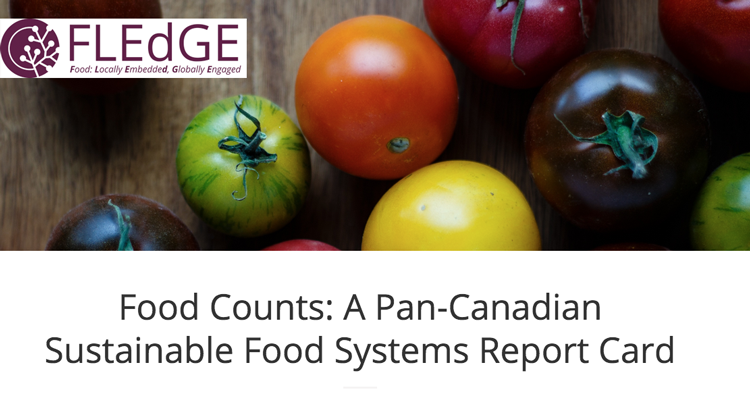Food Counts: A Pan-Canadian Sustainable Food Systems Report Card

New report card uses a comprehensive approach to examine sustainability in Canada’s food systems
A new report card, created by researchers at three Ontario Universities, includes 61 indicators to take a comprehensive look at the sustainability of Canada’s food systems. “Food Counts: A Pan-Canadian Sustainable Food Systems Report Card,” brings together already existing measures of social, environmental, and economic well-being to help researchers, policy makers, and community members examine food systems at the national level. The report card uses a food sovereignty framework to reimagine food as part of an integrated systems perspective in food policy discussions in Canada. According to Dr. Charles Levkoe, Canada Research Chair in Sustainable Food Systems at Lakehead University, “The Food Counts Report Card recognizes the need to include and integrate a broad range of indicators to understand the state of Canada’s food systems.” The report card presents a picture beyond narrow economic goals, instead measuring the cross-cutting, multi-sectoral dimensions needed to assess how sustainable food systems function. It also highlights major gaps in available Pan-Canadian indicators to understand food systems in a comprehensive way.
In response to growing, nation-wide concern about how Canadian food systems are organized and governed, the report card represents a fundamentally different approach which engages the broad range of actors across Canada to determine how to build a healthy, ecological, just, and culturally relevant food system. “Developing sustainable food systems is complicated,” says Dr. Blay-Palmer, director of the Centre for Sustainable Food Systems at Wilfrid Laurier University. “We need to think about how our food is grown or harvested, who has access to healthy food, and how these things impact our environment and local economies. This Food Counts Report Card helps us understand where we are doing well, where we can improve, and where we need more information.”
The Pan-Canadian Sustainable Food Systems Report Card, as a practical tool for reframing Canadian food systems, acts as a benchmark, identifies gaps in data and where case studies can elaborate on successes and limitations, and informs policy making at all levels of government. The Report Card uses an integrative lens to assess the state of sustainable food systems and to prioritize people’s right to take an active role in decision-making. Indicators for the report card were selected to correspond with the seven core pillars of food sovereignty: 1) focuses on food for people; 2) builds knowledge and skills; 3) works with nature; 4) values food providers; 5) localizes food systems; 6) puts control locally; and 7) food is sacred. “The Food Systems Report Card highlights the limitations of existing indicators and the need to reassess the way we approach and advocate for social justice, ecological regeneration, regional economies and active democratic engagement,” says Dr. Levkoe. “There is a lot more research needed to understand the path towards sustainable food futures, and this Report Card is a step in that direction.”
The Pan-Canadian Sustainable Food Systems Report Card is now publicly available and can be accessed online at fledgeresearch.ca/foodcounts.
Please direct questions and media inquiries to Dr. Charles Levkoe at Lakehead University, clevkoe@lakeheadu.ca, Dr. Alison Blay-Palmer at Wilfrid Laurier University, ablaypalmer@wlu.ca or Amanda Di Battista at the Centre for Sustainable Food Studies, Wilfrid Laurier University, adibattista@wlu.ca
- Identifiez-vous pour poster des commentaires
